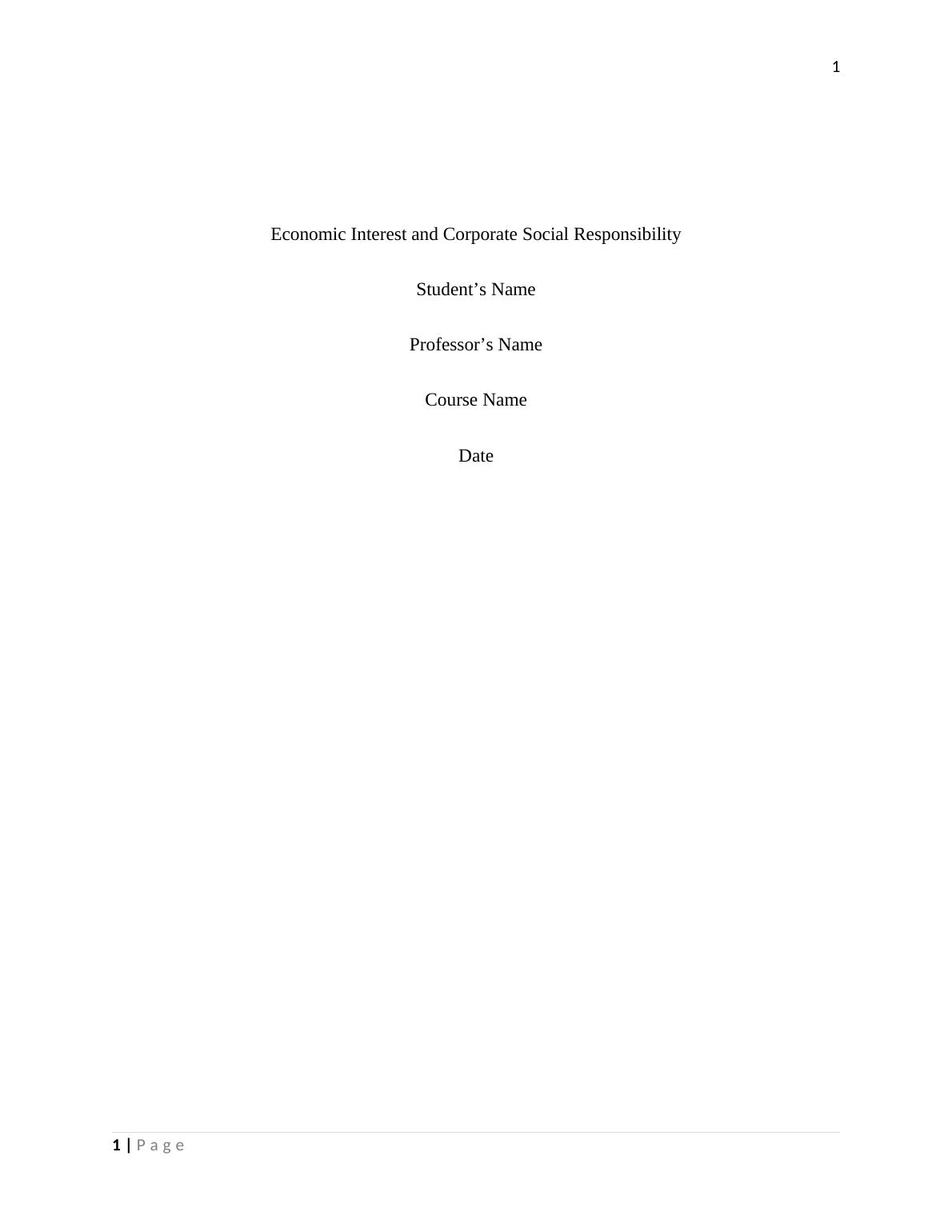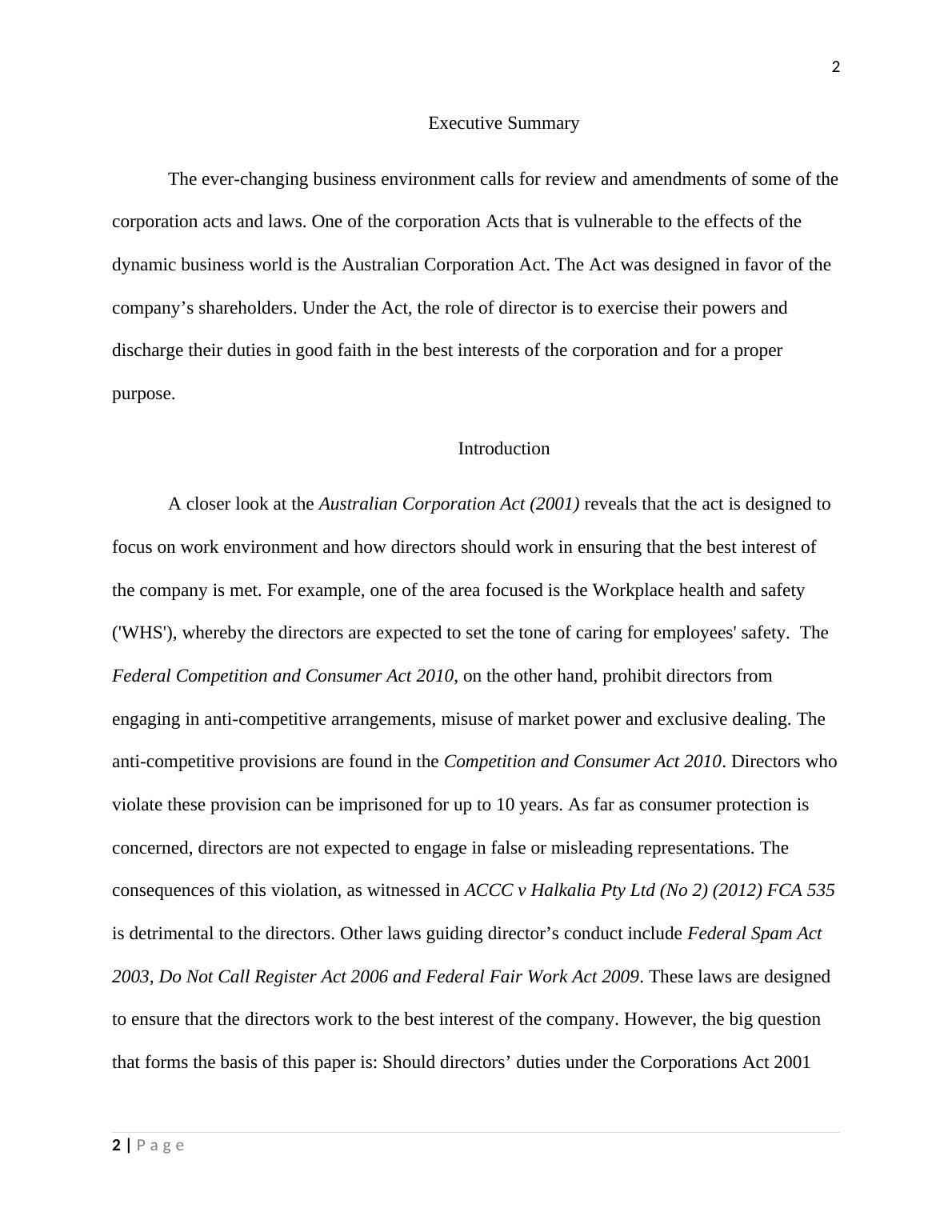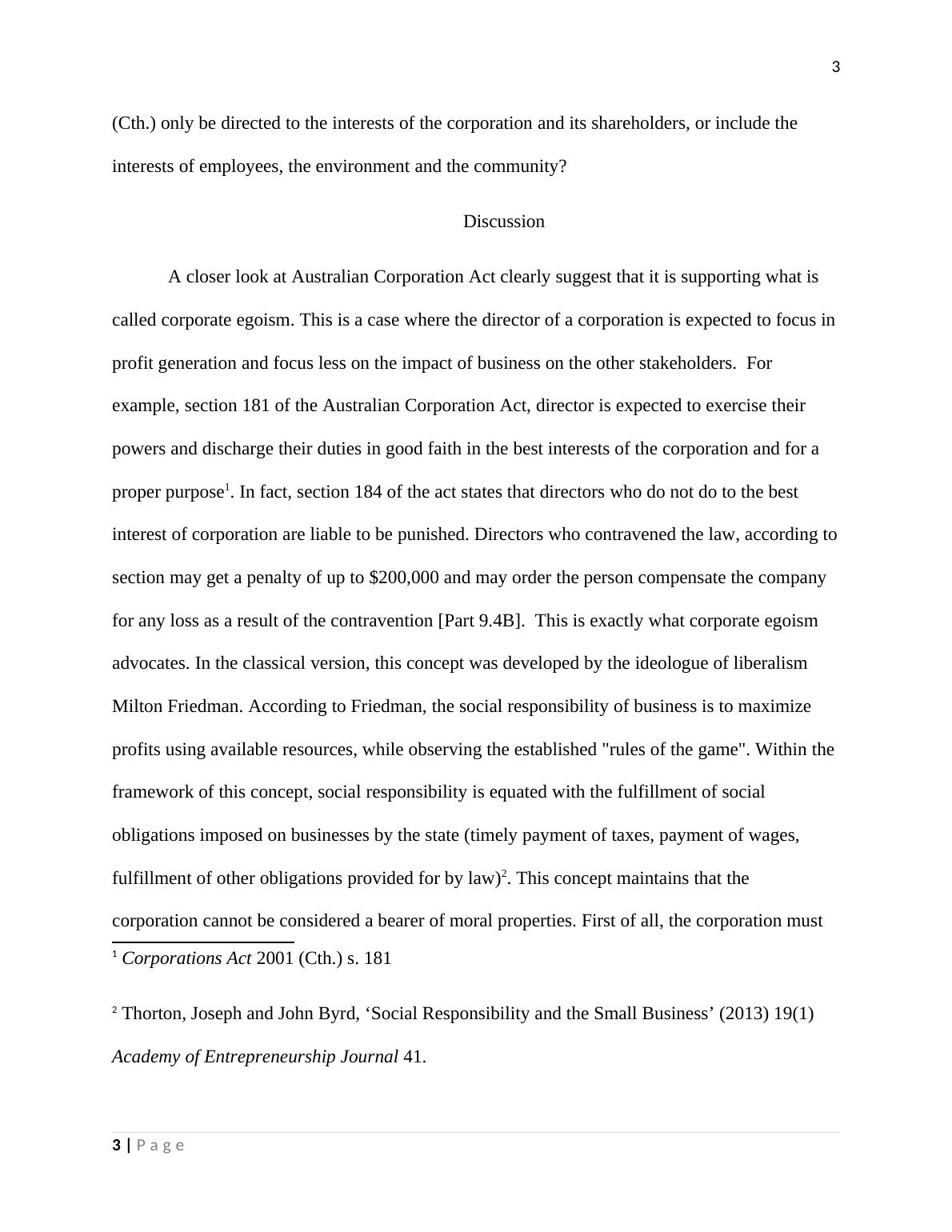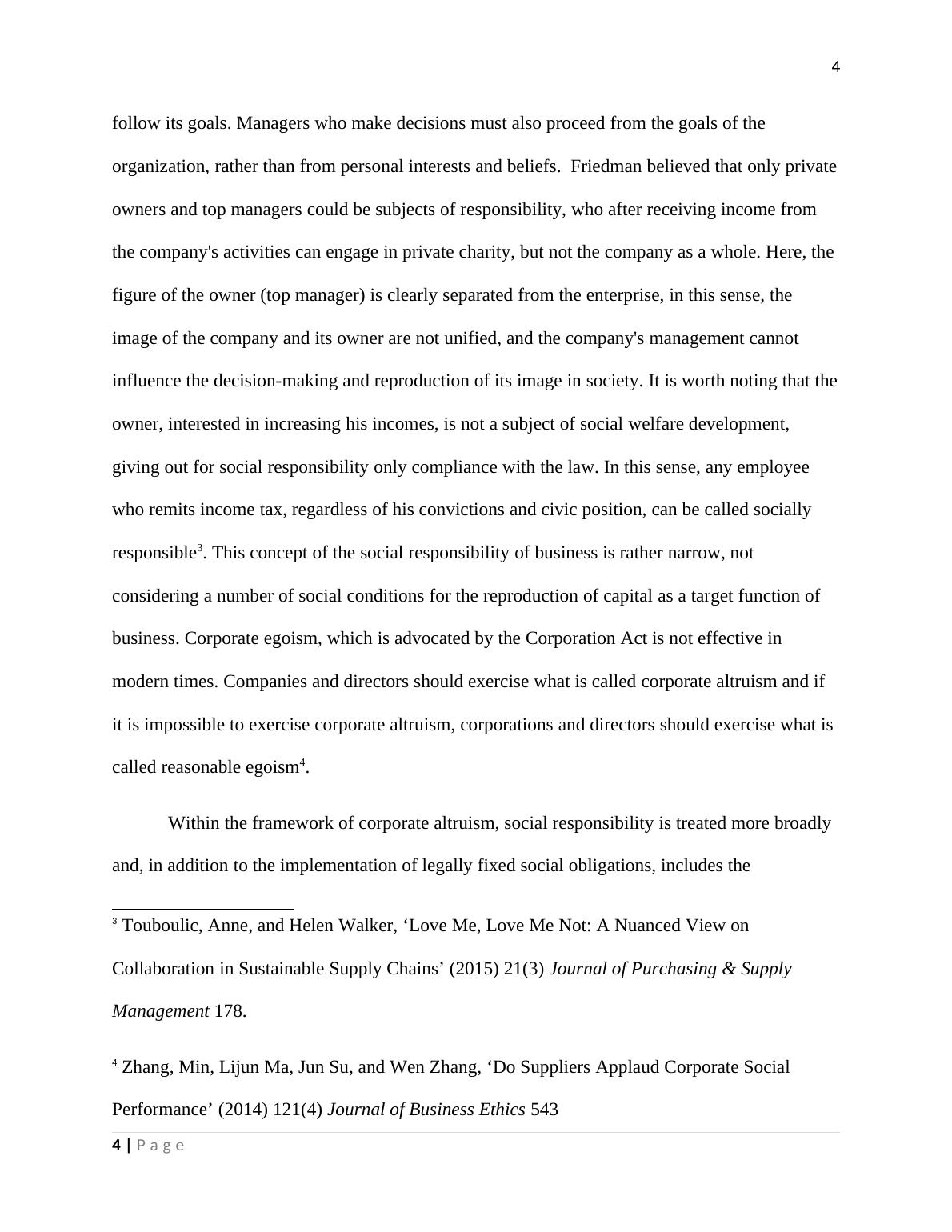Economic Interest and Corporate Social Responsibility
Added on 2023-06-05
14 Pages4104 Words80 Views
1
Economic Interest and Corporate Social Responsibility
Student’s Name
Professor’s Name
Course Name
Date
1 | P a g e
Economic Interest and Corporate Social Responsibility
Student’s Name
Professor’s Name
Course Name
Date
1 | P a g e

2
Executive Summary
The ever-changing business environment calls for review and amendments of some of the
corporation acts and laws. One of the corporation Acts that is vulnerable to the effects of the
dynamic business world is the Australian Corporation Act. The Act was designed in favor of the
company’s shareholders. Under the Act, the role of director is to exercise their powers and
discharge their duties in good faith in the best interests of the corporation and for a proper
purpose.
Introduction
A closer look at the Australian Corporation Act (2001) reveals that the act is designed to
focus on work environment and how directors should work in ensuring that the best interest of
the company is met. For example, one of the area focused is the Workplace health and safety
('WHS'), whereby the directors are expected to set the tone of caring for employees' safety. The
Federal Competition and Consumer Act 2010, on the other hand, prohibit directors from
engaging in anti-competitive arrangements, misuse of market power and exclusive dealing. The
anti-competitive provisions are found in the Competition and Consumer Act 2010. Directors who
violate these provision can be imprisoned for up to 10 years. As far as consumer protection is
concerned, directors are not expected to engage in false or misleading representations. The
consequences of this violation, as witnessed in ACCC v Halkalia Pty Ltd (No 2) (2012) FCA 535
is detrimental to the directors. Other laws guiding director’s conduct include Federal Spam Act
2003, Do Not Call Register Act 2006 and Federal Fair Work Act 2009. These laws are designed
to ensure that the directors work to the best interest of the company. However, the big question
that forms the basis of this paper is: Should directors’ duties under the Corporations Act 2001
2 | P a g e
Executive Summary
The ever-changing business environment calls for review and amendments of some of the
corporation acts and laws. One of the corporation Acts that is vulnerable to the effects of the
dynamic business world is the Australian Corporation Act. The Act was designed in favor of the
company’s shareholders. Under the Act, the role of director is to exercise their powers and
discharge their duties in good faith in the best interests of the corporation and for a proper
purpose.
Introduction
A closer look at the Australian Corporation Act (2001) reveals that the act is designed to
focus on work environment and how directors should work in ensuring that the best interest of
the company is met. For example, one of the area focused is the Workplace health and safety
('WHS'), whereby the directors are expected to set the tone of caring for employees' safety. The
Federal Competition and Consumer Act 2010, on the other hand, prohibit directors from
engaging in anti-competitive arrangements, misuse of market power and exclusive dealing. The
anti-competitive provisions are found in the Competition and Consumer Act 2010. Directors who
violate these provision can be imprisoned for up to 10 years. As far as consumer protection is
concerned, directors are not expected to engage in false or misleading representations. The
consequences of this violation, as witnessed in ACCC v Halkalia Pty Ltd (No 2) (2012) FCA 535
is detrimental to the directors. Other laws guiding director’s conduct include Federal Spam Act
2003, Do Not Call Register Act 2006 and Federal Fair Work Act 2009. These laws are designed
to ensure that the directors work to the best interest of the company. However, the big question
that forms the basis of this paper is: Should directors’ duties under the Corporations Act 2001
2 | P a g e

3
(Cth.) only be directed to the interests of the corporation and its shareholders, or include the
interests of employees, the environment and the community?
Discussion
A closer look at Australian Corporation Act clearly suggest that it is supporting what is
called corporate egoism. This is a case where the director of a corporation is expected to focus in
profit generation and focus less on the impact of business on the other stakeholders. For
example, section 181 of the Australian Corporation Act, director is expected to exercise their
powers and discharge their duties in good faith in the best interests of the corporation and for a
proper purpose1. In fact, section 184 of the act states that directors who do not do to the best
interest of corporation are liable to be punished. Directors who contravened the law, according to
section may get a penalty of up to $200,000 and may order the person compensate the company
for any loss as a result of the contravention [Part 9.4B]. This is exactly what corporate egoism
advocates. In the classical version, this concept was developed by the ideologue of liberalism
Milton Friedman. According to Friedman, the social responsibility of business is to maximize
profits using available resources, while observing the established "rules of the game". Within the
framework of this concept, social responsibility is equated with the fulfillment of social
obligations imposed on businesses by the state (timely payment of taxes, payment of wages,
fulfillment of other obligations provided for by law)2. This concept maintains that the
corporation cannot be considered a bearer of moral properties. First of all, the corporation must
1 Corporations Act 2001 (Cth.) s. 181
2 Thorton, Joseph and John Byrd, ‘Social Responsibility and the Small Business’ (2013) 19(1)
Academy of Entrepreneurship Journal 41.
3 | P a g e
(Cth.) only be directed to the interests of the corporation and its shareholders, or include the
interests of employees, the environment and the community?
Discussion
A closer look at Australian Corporation Act clearly suggest that it is supporting what is
called corporate egoism. This is a case where the director of a corporation is expected to focus in
profit generation and focus less on the impact of business on the other stakeholders. For
example, section 181 of the Australian Corporation Act, director is expected to exercise their
powers and discharge their duties in good faith in the best interests of the corporation and for a
proper purpose1. In fact, section 184 of the act states that directors who do not do to the best
interest of corporation are liable to be punished. Directors who contravened the law, according to
section may get a penalty of up to $200,000 and may order the person compensate the company
for any loss as a result of the contravention [Part 9.4B]. This is exactly what corporate egoism
advocates. In the classical version, this concept was developed by the ideologue of liberalism
Milton Friedman. According to Friedman, the social responsibility of business is to maximize
profits using available resources, while observing the established "rules of the game". Within the
framework of this concept, social responsibility is equated with the fulfillment of social
obligations imposed on businesses by the state (timely payment of taxes, payment of wages,
fulfillment of other obligations provided for by law)2. This concept maintains that the
corporation cannot be considered a bearer of moral properties. First of all, the corporation must
1 Corporations Act 2001 (Cth.) s. 181
2 Thorton, Joseph and John Byrd, ‘Social Responsibility and the Small Business’ (2013) 19(1)
Academy of Entrepreneurship Journal 41.
3 | P a g e

4
follow its goals. Managers who make decisions must also proceed from the goals of the
organization, rather than from personal interests and beliefs. Friedman believed that only private
owners and top managers could be subjects of responsibility, who after receiving income from
the company's activities can engage in private charity, but not the company as a whole. Here, the
figure of the owner (top manager) is clearly separated from the enterprise, in this sense, the
image of the company and its owner are not unified, and the company's management cannot
influence the decision-making and reproduction of its image in society. It is worth noting that the
owner, interested in increasing his incomes, is not a subject of social welfare development,
giving out for social responsibility only compliance with the law. In this sense, any employee
who remits income tax, regardless of his convictions and civic position, can be called socially
responsible3. This concept of the social responsibility of business is rather narrow, not
considering a number of social conditions for the reproduction of capital as a target function of
business. Corporate egoism, which is advocated by the Corporation Act is not effective in
modern times. Companies and directors should exercise what is called corporate altruism and if
it is impossible to exercise corporate altruism, corporations and directors should exercise what is
called reasonable egoism4.
Within the framework of corporate altruism, social responsibility is treated more broadly
and, in addition to the implementation of legally fixed social obligations, includes the
3 Touboulic, Anne, and Helen Walker, ‘Love Me, Love Me Not: A Nuanced View on
Collaboration in Sustainable Supply Chains’ (2015) 21(3) Journal of Purchasing & Supply
Management 178.
4 Zhang, Min, Lijun Ma, Jun Su, and Wen Zhang, ‘Do Suppliers Applaud Corporate Social
Performance’ (2014) 121(4) Journal of Business Ethics 543
4 | P a g e
follow its goals. Managers who make decisions must also proceed from the goals of the
organization, rather than from personal interests and beliefs. Friedman believed that only private
owners and top managers could be subjects of responsibility, who after receiving income from
the company's activities can engage in private charity, but not the company as a whole. Here, the
figure of the owner (top manager) is clearly separated from the enterprise, in this sense, the
image of the company and its owner are not unified, and the company's management cannot
influence the decision-making and reproduction of its image in society. It is worth noting that the
owner, interested in increasing his incomes, is not a subject of social welfare development,
giving out for social responsibility only compliance with the law. In this sense, any employee
who remits income tax, regardless of his convictions and civic position, can be called socially
responsible3. This concept of the social responsibility of business is rather narrow, not
considering a number of social conditions for the reproduction of capital as a target function of
business. Corporate egoism, which is advocated by the Corporation Act is not effective in
modern times. Companies and directors should exercise what is called corporate altruism and if
it is impossible to exercise corporate altruism, corporations and directors should exercise what is
called reasonable egoism4.
Within the framework of corporate altruism, social responsibility is treated more broadly
and, in addition to the implementation of legally fixed social obligations, includes the
3 Touboulic, Anne, and Helen Walker, ‘Love Me, Love Me Not: A Nuanced View on
Collaboration in Sustainable Supply Chains’ (2015) 21(3) Journal of Purchasing & Supply
Management 178.
4 Zhang, Min, Lijun Ma, Jun Su, and Wen Zhang, ‘Do Suppliers Applaud Corporate Social
Performance’ (2014) 121(4) Journal of Business Ethics 543
4 | P a g e

End of preview
Want to access all the pages? Upload your documents or become a member.
Related Documents
CASE ANALYSIS. Case Summary Growfast Pty Lid has threlg...
|7
|325
|437
Business Lawlg...
|6
|1238
|361
Corporation Law: Director Duties and Executive Remuneration in Australialg...
|8
|1684
|107
Directors’ Duties: Gold Dig Ltd Case Studylg...
|4
|817
|292
LAW2001: Corporate Law Assignmentlg...
|14
|2870
|102
Company Lawlg...
|14
|2801
|79
